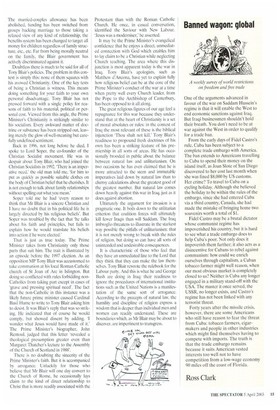Banned wagon: global
A weekly survey of world restrictions on freedom and free trade
One of the arguments advanced in favour of the war on Saddam Hussein's regime is that it will enable the West to end economic sanctions against Iraq. But Iraqi businessmen shouldn't hold their breath. You don't need to be at war against the West in order to qualify for a trade ban.
From the early days of Fidel Castro's rule, Cuba has been subject to a complete trade embargo with America. The ban extends to Americans travelling to Cuba to spend their money on the island itself, as Joan Slote of San Diego discovered to her cost last month when she was fined $8,000 by US customs. Her crime? To travel to Cuba on a cycling holiday. Although she believed the holiday to be within the rules of the embargo, since she had entered Cuba via a third country, Canada, she had made the mistake of bringing home two souvenirs worth a total of $1.
Fidel Castro may be a brutal dictator whose communist regime has impoverished his country, but it is hard to see what a trade embargo does to help Cuba's poor. Not only does it impoverish them further; it also acts as a disincentive for Cubans to rebel against communism: how could we enrich ourselves through capitalism, a Cuban tobacco farmer might well reason, when our most obvious market is completely closed to us? Neither is Cuba any longer engaged in a military stand-off with the USA. The master it once served, the USSR, no longer exists, and Castro's regime has not been linked with any terrorist threat.
Forty years after the missile crisis, however, there are some Americans who still have reason to fear the threat from Cuba: tobacco farmers, cigarmakers and people in other industries which might find themselves having to compete with imports. The truth is that the trade embargo remains because it suits American vested interests too well not to have competition from a low-wage economy 90 miles off the coast of Florida.
Ross Clark


































































 Previous page
Previous page